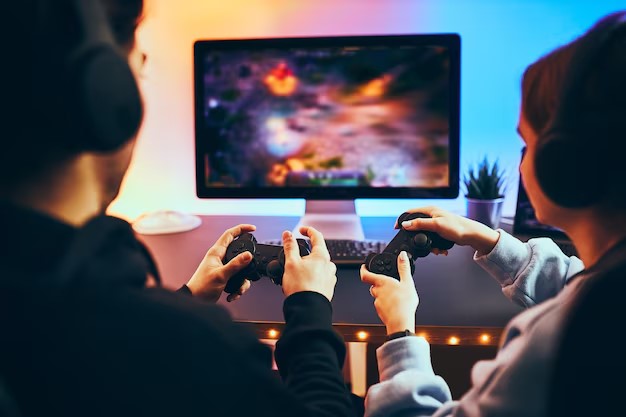Why We Love Online Games: The Psychology Behind It

Have you ever wondered why online games captivate millions of players worldwide? From children to adults, everyone seems to find joy in logging into their favorite games. Whether it’s a quick round of Fortnite, a strategy session in Clash of Clans, or an intense match of PUBG, online games have become more than just a pastime. But what makes them so irresistible? Let’s delve into the psychology behind our love for online games.
The Thrill of Achievement
One of the biggest reasons we love online games is the sense of accomplishment they offer. Games are designed with goals, challenges, and rewards. Completing a mission, leveling up, or unlocking a new skill gives players a dopamine rush – the brain’s way of rewarding us for achieving something.
For instance, in games like Tiranga Game, it offers cash prizes when you predict the right colour for the next outcome. Players feel a sense of pride when their efforts lead to success.
Escaping Reality
Life can be stressful, and online games provide a perfect escape. Entering a fantasy world allows players to forget their worries and immerse themselves in a new reality. Whether it’s exploring magical lands in World of Warcraft or surviving on a deserted island in Minecraft, these virtual universes let us step away from our daily routines.
This form of escapism isn’t necessarily bad. Psychologists argue that it helps individuals manage stress, giving them a mental break before returning to real-world challenges.
Social Connections
Online games are no longer solitary experiences. Many games encourage or require teamwork and communication. Games like Fortnite and Call of Duty allow players to team up with friends or meet new people online. These shared experiences foster connections, creating a sense of community.
For some, gaming is a way to maintain long-distance friendships or bond with family members. The shared victories and defeats can strengthen relationships, making gaming a social activity.
The Appeal of Competition
Humans are naturally competitive, and online games tap into this instinct. Competing against others, whether it’s a race, a battle, or a strategy game, fuels adrenaline and excitement. Games like PUBG and League of Legends thrive on this competitive edge, where players can test their skills against opponents from around the world.
The ranking systems in many games add another layer of motivation. Climbing the leaderboards or earning rare titles becomes a driving force for players to improve and keep playing.
Creative Freedom
Games like Minecraft and The Sims offer players the chance to build, design, and create. This creative freedom is highly appealing, as it allows players to express themselves. Whether constructing elaborate structures or designing unique characters, these games provide an outlet for imagination.
For many, this creativity brings a sense of joy and fulfillment. It’s like being handed a blank canvas and unlimited tools to bring your ideas to life.
The Role of Rewards and Progression
Game developers understand the importance of keeping players engaged. They use progression systems and rewards to ensure players feel like they are constantly advancing. Daily quests, achievements, and rewards for logging in are all tactics used to maintain interest.
For example, Candy Crush Saga offers rewards for consecutive days of play, encouraging players to return regularly. This “reward loop” is highly addictive, as players want to see what they can achieve next.
Fantasy and Exploration
Online fantasy games, in particular, appeal to our love for exploration and adventure. Titles like Diuwin Game and The Legend of Zelda invite players into beautifully crafted worlds filled with mysteries, treasures, and challenges. These games let players live out their fantasies, whether it’s being a heroic warrior, a powerful sorcerer, or an adventurous explorer.
The vast, open-world designs in these games provide endless possibilities, ensuring players always have something new to discover.
How Online Games Improve Skills
While online games are often viewed as entertainment, they also help players develop valuable skills. Strategy games improve problem-solving and decision-making abilities, while multiplayer games enhance teamwork and communication skills. Even fast-paced games like Valorant and Apex Legends require quick thinking and hand-eye coordination.
These benefits make gaming more than just a hobby. For many, it’s a way to sharpen their minds and stay mentally active.
Examples of Popular Online Fantasy Games
- Fortnite: This battle royale game combines shooting, strategy, and building, offering endless action and creativity.
- PUBG (PlayerUnknown’s Battlegrounds): Known for its intense gameplay, PUBG challenges players to be the last one standing.
- Clash of Clans: A strategy game where players build their village, form alliances, and compete against others.
- World of Warcraft: A massive multiplayer online role-playing game (MMORPG) set in a rich fantasy world.
- Minecraft: A sandbox game that lets players create, explore, and survive in a blocky, pixelated world.
Balancing Gaming and Real Life
While online games offer numerous benefits, it’s essential to strike a balance. Too much gaming can lead to neglect of responsibilities and health issues. Setting limits, taking breaks, and engaging in other activities are crucial for maintaining a healthy lifestyle.
Parents can play an active role in guiding younger gamers by encouraging moderation and ensuring age-appropriate content.
Conclusion
Online games are more than just entertainment. They connect us, challenge us, and provide an escape from reality. By understanding the psychology behind their appeal, we can appreciate why they have become such an integral part of modern culture. So, the next time you pick up your controller or log into your favorite game, know that you’re not just playing; you’re exploring, achieving, and connecting with a vast community of gamers worldwide.





